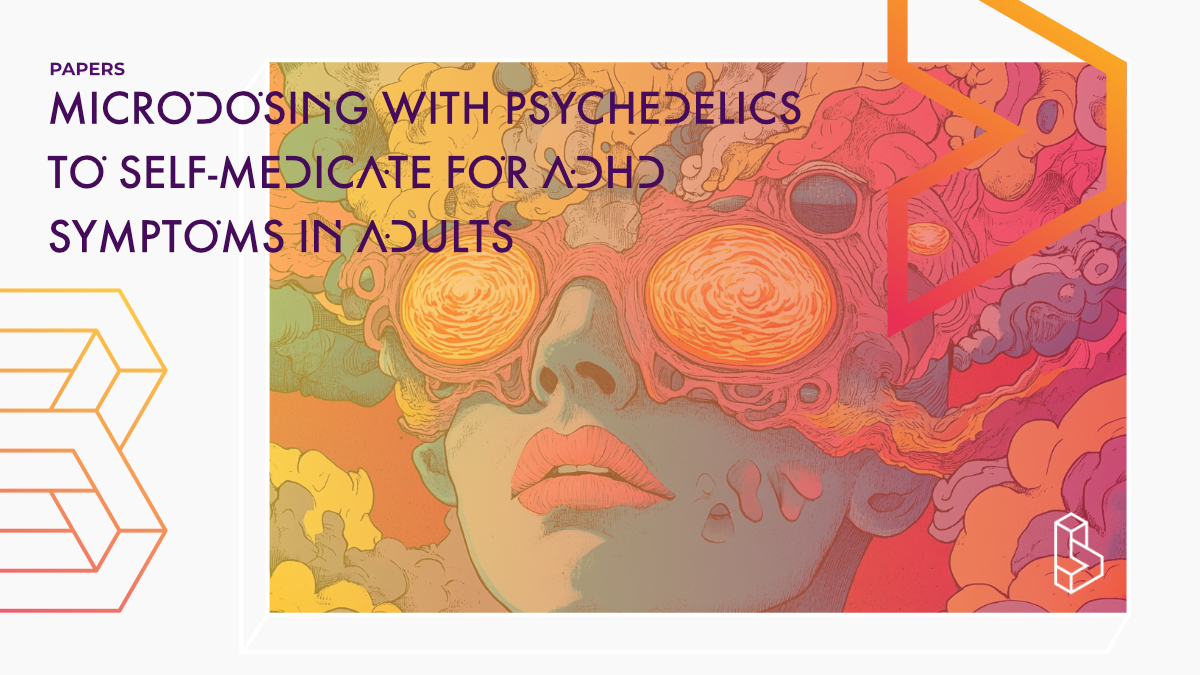This prospective survey study (n=247) finds that those who microdose psychedelics to manage ADHD symptoms experience benefits from it. Participants scored higher on well-being after two and four weeks. The study design, a prospective survey, makes it possible to draw causal inferences (microdosing causing the improvement), but the study had a large drop-out rate (n=46 at 4 weeks).
Abstract of Microdosing with psychedelics to self-medicate for ADHD symptoms in adults:
“ADHD in adulthood is often overlooked, which negatively affects the individual’s well-being. First-line pharmacological interventions are effective in many ADHD patients, relieving symptoms rapidly. However, there seems to be a proportion of individuals who discontinue, or fail to respond to these treatments. For these individuals, alternative treatment options should be explored. A retrospective survey study reported that using classic psychedelics in low, repeated doses, so called microdosing (MD), was more effective than conventional treatments for ADHD. The current prospective study aimed to measure the effect of MD on ADHD symptoms, well-being and temporal processing, since this cognitive domain is often impaired in ADHD. Adults with ADHD who had the intention to start MD on their initiative to self-treat their symptoms were measured before MD and two- and four weeks later. We expected a decrease in ADHD symptoms, an increase in well-being, and enhanced performance on a time perception task after MD. We explored if conventional medication use alongside MD and comorbidities alongside ADHD influenced the effect of MD. Sample sizes included N=226, N=65, and N=46, respectively. We found decreases and increases in ADHD symptoms and well-being, respectively. Time perception was only affected in individuals using conventional medication alongside MD, by over-reproducing the 1000 ms time interval. Conventional medication use and having comorbidities did not change the effect of MD on ADHD symptomatology and well-being after four weeks of MD. Placebo-controlled experimental studies are needed to explore whether there is a beneficial effect of MD for ADHD, beyond the placebo-effect.”
Authors: Eline C. H. M. Haijen, Petra P. M. Hurks & Kim P. C. Kuypers
Summary of Microdosing with psychedelics to self-medicate for ADHD symptoms in adults
Attention deficit hyperactivity disorder (ADHD) is a common developmental disorder in youths and adults. About 2.6% of adults have persistent ADHD. ADHD in adulthood is often associated with financial distress, a higher risk of criminality and suicidality, resulting in serious detrimental consequences for an individual’s quality of life and well-being. ADHD is often overlooked because of the high comorbidity rate and lack of knowledge about how ADHD is expressed in adulthood.
First-line ADHD treatments in adults mainly include pharmacological interventions to enhance dopaminergic and noradrenergic neurotransmission with stimulants, such as methylphenidate and amphetamine, and non-stimulant agents, such as atomoxetine. However, many adults with ADHD fail to respond to prescribed medication, which is associated with a lower quality of life.
Find this paper
https://doi.org/10.1016/j.nsa.2022.101012
Open Access | Google Scholar | Backup | 🕊
Cite this paper (APA)
Haijen, E. C., Hurks, P. P., & Kuypers, K. P. (2022). Microdosing with psychedelics to self-medicate for ADHD symptoms in adults: A prospective naturalistic study. Neuroscience Applied, 1, 101012.
Study details
Compounds studied
Psilocybin
LSD
Topics studied
Microdosing
Study characteristics
Survey
Participants
233
Humans
Authors
Authors associated with this publication with profiles on Blossom
Kim KuypersKim Kuypers is a researcher at Maastricht University. Her work is concerned with understanding the neurobiology underlying flexible cognition, empathy, and well-being. One of the main ways she does is with the use of psychedelics.
Institutes
Institutes associated with this publication
Maastricht UniversityMaastricht University is host to the psychopharmacology department (Psychopharmacology in Maastricht) where various researchers are investigating the effects of psychedelics.
Linked Research Papers
Notable research papers that build on or are influenced by this paper
Effects of Psychedelic Microdosing versus Conventional ADHD Medication Use on Emotion Regulation, Empathy, and ADHD Symptoms in Adults with severe ADHD symptoms: A Naturalistic Prospective Comparison StudyThis prospective survey (n=233, 64, 44) explores microdosing's (MD) impact on emotional regulation (ER) and empathy in adults with severe ADHD symptoms. Positive effects on ER and empathy were observed, specifically in cognitive reappraisal, expressive suppression, perspective-taking, and personal distress. However, a comparison with those using only conventional medications (n=180, 50, 38 MD; n=37, 27, 28 conventional) revealed that after four weeks, only expressive suppression improvement persisted, and cognitive reappraisal and empathy enhancements disappeared.
Trait mindfulness and personality characteristics in a microdosing ADHD sample: a naturalistic prospective survey study
This observational study (n=233) investigates the impact of four weeks of microdosing (MD) on mindfulness and personality traits in adults with ADHD. Findings indicate increased mindfulness and decreased neuroticism post-MD, with no significant changes in other personality traits. The use of conventional ADHD medication or the presence of comorbidities didn't affect the outcomes, suggesting MD may alter stable traits independently of these factors.

